Residents expected to vacate 5 homeless encampments as city-imposed deadline arrives
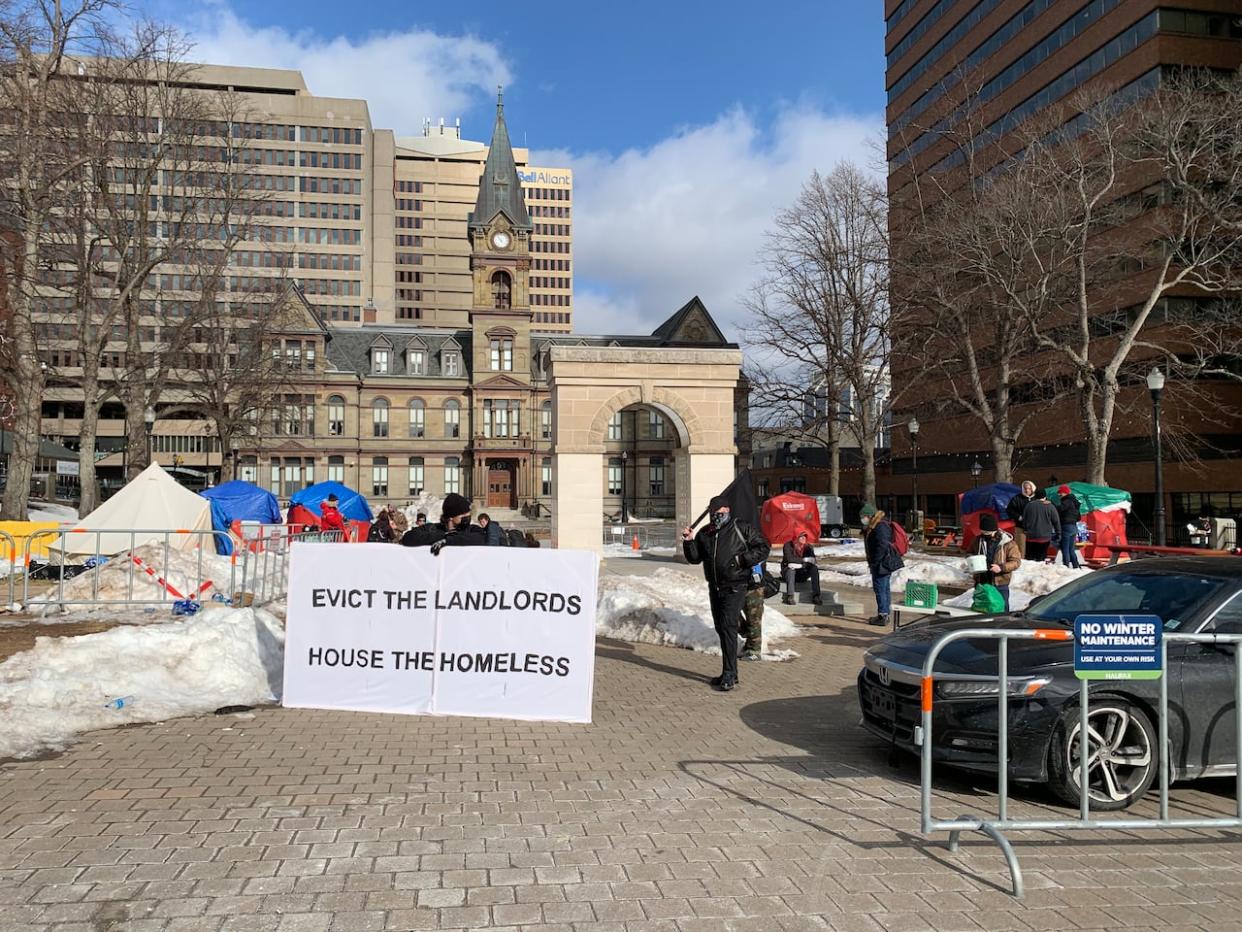
As Halifax's deadline for people to leave five homeless encampments passed Monday, a couple expecting a child said they intend to remain at one of the sites because they have no other options.
Ron Richards said he and his pregnant wife returned late last week to sleeping in an ice-fishing tent pitched in a downtown city square because the shelter they had been in felt unsafe and they had nowhere else to go.
"We're going to have to stay here. We've got no other place, nothing. And I'm trying every day," Richards said in an interview with the Canadian Press on Monday, adding that he searches online daily for apartment and room rentals and has tried to get into provincial public housing with no success.
Richards said that since moving back to the encampment at the square known as the Grand Parade, he had expected to hear from Halifax outreach workers to learn about alternative housing options, but he and his wife haven't heard from anyone.
The city had asked earlier this month that unhoused people staying in tents at five of 11 authorized encampments leave by Feb. 26. Residents were told they could be fined or even arrested if they don't comply.
It said the encampments, including one at Grand Parade, pose a safety risk and that better options are available.
In hopes of finding a place indoors, Richards said he recently called the transitional housing shelter established by the province in a former hotel across the harbour in Dartmouth, but he was told there was nothing available for them.
"I'm a licensed mechanic by trade, but I can't find work in order to afford rental housing because I can't leave her alone,
pregnant in a tent," he said. "It's just so hard. We're just normal people. The government won't help us."
The homelessness situation in Nova Scotia came to a head last year, as rents rose faster than anywhere else in Canada while vacancy rates remained low. As of Feb. 20, there were more than 1,100 people in the Halifax Regional Municipality who are homeless, according to the Affordable Housing Association of Nova Scotia.
In October, the Halifax Regional Municipality designated 11 sites around the city as tenting areas for people without housing as a stop-gap measure until better indoor options became available. The locations include Grand Parade, Victoria Park, the Geary Street green space in Dartmouth, at Saunders Park and at the ballfield on Cobequid Road in Lower Sackville.
The province and municipality have opened other accommodations in recent months, including an overnight shelter at the former St. Paul Church in Dartmouth and a supportive housing facility at the former Waverley Inn in Halifax's south end.
Last month, the province also opened the Halifax Forum as a 24/7 shelter that's operated by the non-profit 902 Man Up. It still has spots reserved for those leaving the encampments.
Richards and his wife stayed at that shelter briefly, but they left because they were not permitted to stay together. "And she doesn't like to be there by herself because of all the drugs and stuff that's going on at the Forum. She's scared to be there by herself," he said.
Meanwhile, several Pallet shelters are expected to open in the coming weeks and construction on a tiny home village is supposed to start next month.
On Friday, the city said 25 of the approximately 55 people staying at the five encampments had accepted indoor shelter.
Service providers were discussing "appropriate indoor sheltering" with those who remain, the municipality said. But some unhoused people have previously indicated they won't leave by the deadline.
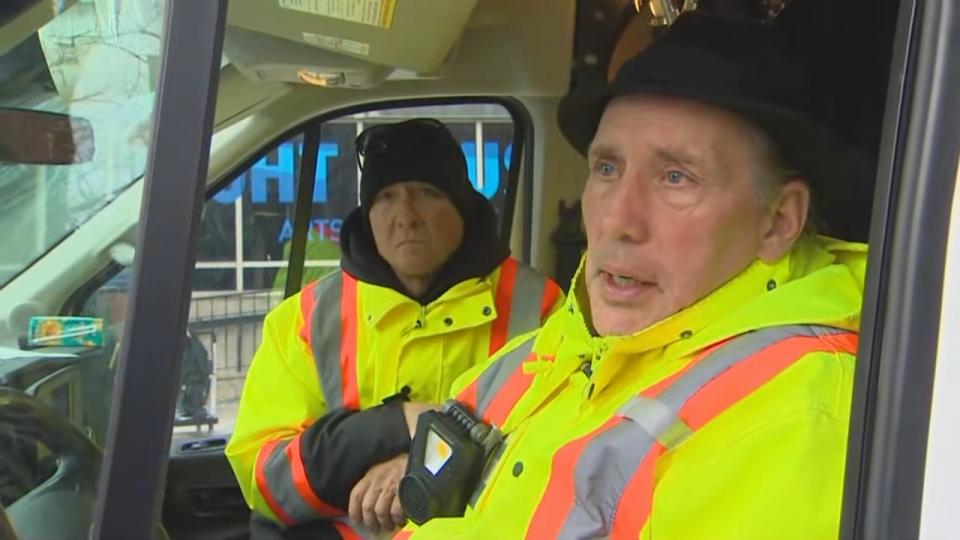
Matthew Grant, left, and Stephen Wilsack, were at Grand Parade in Halifax on Monday. This is their last official day there, to comply with city orders. (David Laughlin/CBC)
Steve Wilsack, the co-founder of Sleep On It, an organization that provides supplies for people living in tents in Halifax, said there were about 15 to 20 people still living at Grand Parade as of Monday morning.
While the city has opened a shelter at the Halifax Forum, he said that isn't an option for everyone. Some people feel unsafe in shelter settings, fearing theft or physical altercations, he said.
"This is people's lives that we are talking about here. The shelter is [for] emergency situations, for a night or two, it's not a place to be residing."
Wilsack said people want to stay at Grand Parade, partly because there is a sense of community there.
"This is a roof over someone's head. This is four walls of sanity," he said. "Unfortunately, it's a tent. Until we get something else set up, this is home."
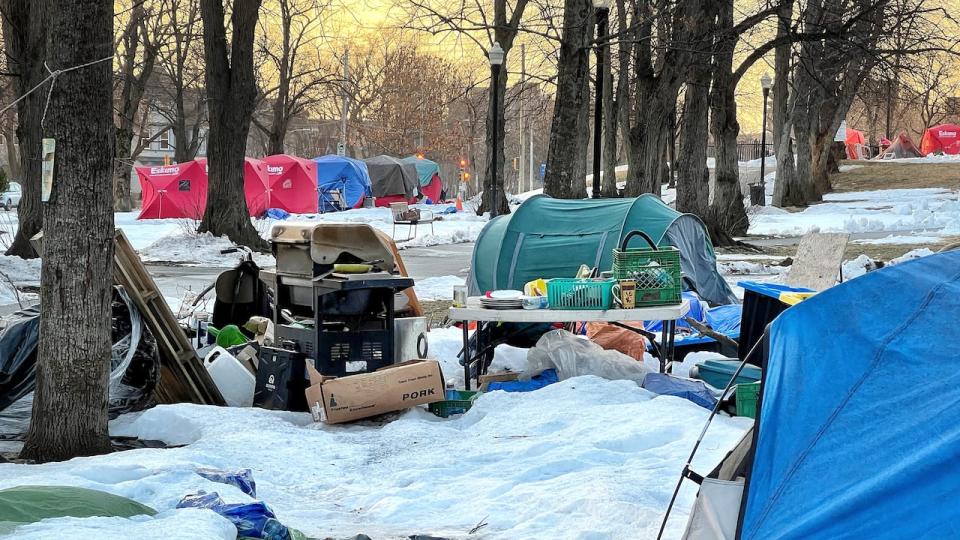
A number of tents were still up at the encampment at Victoria Park on Monday. (Brett Ruskin/CBC)
About 40 people gathered at Grand Parade on Monday morning to show their support for residents still living in that encampment.
Matthew Grant, the other co-founder of Sleep On It, said it's great that people are choosing to support those living in the encampment by protesting peacefully.
He said the protesters share the concerns of the encampment volunteers.
"They're concerned that their fellow humans, fellow Nova Scotians, don't have four walls, they don't have security, they don't have privacy, they don't have decency," Grant said.
Wilsack said he doesn't expect anyone to be removed from their tents if they do choose to stay past Monday.
A man who identified himself to Radio-Canada only as John Doe said he's been at the site since mid-January and he's frustrated by the current situation.
"It's hard to say what's going to happen. I hope nothing, because, yeah, OK, we would prefer to be in homes, but we don't have a choice right now," he said early Monday.
He said he'd like the city to leave the Grand Parade encampment alone, as there's a sense of community, it's close to amenities and other locations and shelters aren't suitable for some residents there.
"We might be homeless, but we're still human," he said.
A resident of the Victoria Park encampment, who identified himself only as Jay, said he's been homeless since last April.
He said he's feeling stressed out but he's also relieved that work is being done to help people who are living in tents.
"For the community, I can see a lot of issues involved with the encampments. I think that the city is trying — there is adequate shelters in place — but in the same breath, there's a lot of issues," he said.
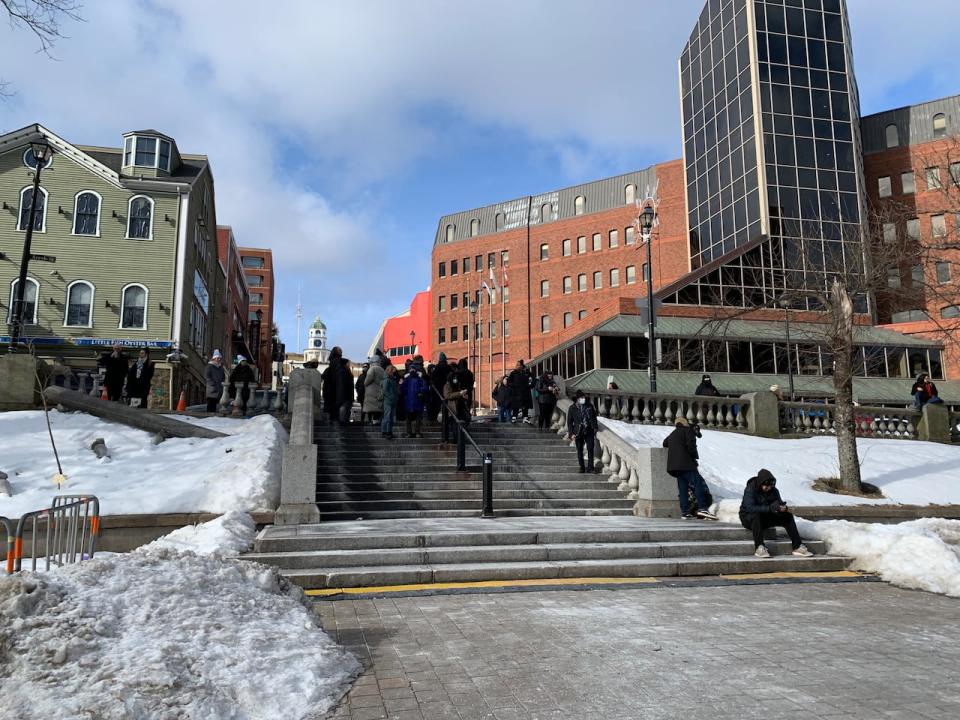
About 40 people gathered at Grand Parade in Halifax early Monday to show support for the people living in tents there. (Julie Sicot/CBC)
He said he's hopeful that closing the five encampments will shed light on the homelessness situation, and will show that there needs to be more affordable housing and more support for mental health and addictions.
He said he's planning to stay in a tent in another encampment, rather than going to a shelter.
Michelle Calder, a volunteer with the non-profit group called the Gated Community Association, said there are still 14 people living at the Lower Sackville ballfield encampment.
She called the evictions premature, as many people are still looking for other accommodations.
Calder said she's disappointed there aren't more options, as many feel unsafe going to the Halifax Forum, which she described as "one giant room with curtains dividing people."
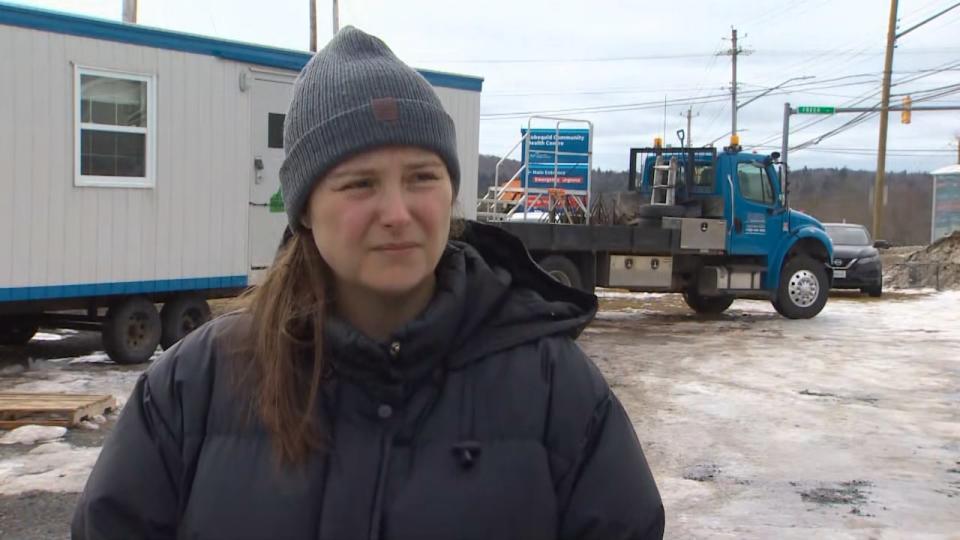
Michelle Calder, a volunteer with the Gated Community Association, says she's disappointed about the lack of options for people sleeping rough. (David Laughlin/CBC)
She said the space doesn't provide adequate privacy, security or safety from others in the space.
"It's a really unhealthy environment for anyone to spend any length of time, and if you're trying to recover, trying to improve your own mental health, it's not a good environment to be in," she said.
Calder said some of the residents from the ballfield site have been able to get into Pallet shelters, but it's not enough.
"If another option was available that had that privacy and had that dignity, absolutely people would want to go there. And we want that for people. We want people to be indoors. We want people to be safe, warm. They want that too," she said.
"Those options aren't available right now, and this eviction is really making that very plain."
Calder said she hopes the city will keep the encampments open for now, while people try to find other places to stay.
Suzanne Ley is the executive director of employment support and income assistance with the Department of Community Services.
She said the department has been working with service providers and outreach teams to contact each person living in the encampments to help identify what option would be best for them.
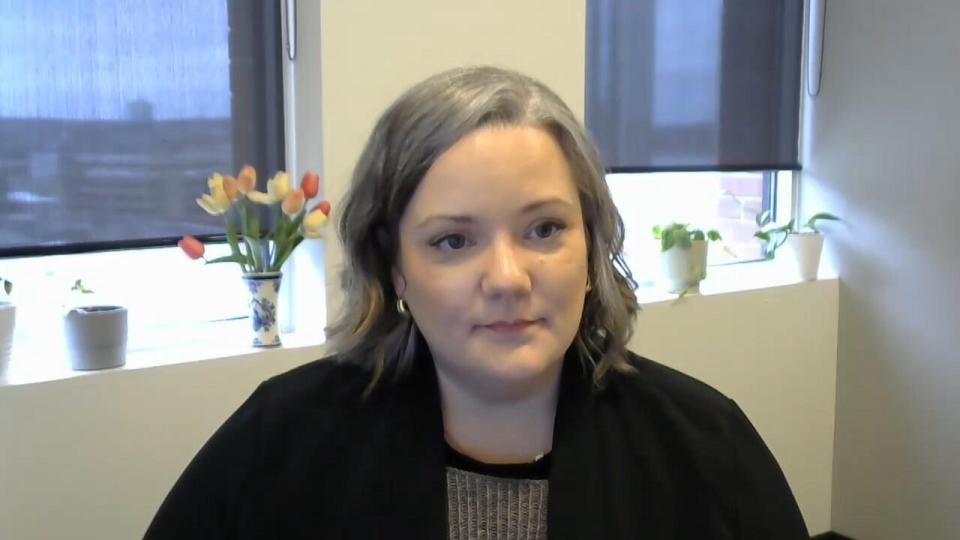
Suzanne Ley is the executive director of employment support and income assistance with the Department of Community Services. (CBC)
Ley said she understands that some people are hesitant to go to the Forum.
"The Forum is not ideal — shelters aren't ideal," Ley said.
"What we want is long-term sustainable options — whether that's supportive housing, affordable housing — whatever kinds of suits an individual's circumstances, but I would also say … sleeping rough is maybe less ideal than sleeping inside. We absolutely recognize it doesn't work for everybody."
As of Friday, she said there were still 14 beds available at the Halifax Forum for people leaving the encampments.
She said 13 of the new Pallet shelters have also been occupied, with another six to be filled in the coming days.
Marie-France Leblanc, the president and CEO of the North End Community Health Centre, said the organization will continue to offer services to the people who have been asked to leave the encampments, no matter where they end up.
She said street navigators have been meeting with people at the encampments to keep tabs on where they will be going.
"Our focus and our goal right now is to make sure everybody that we support, and even those that we don't support, that everyone gets an appropriate location for them so that they can feel safe and they can get the supports that they need," she said.
MORE TOP STORIES


